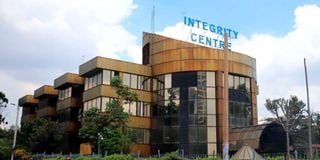Civil societies in 11 counties to receive Sh330m to fight corruption

Integrity Centre that hosts Ethics and Anti-Corruption Commission (EACC) offices in Nairobi.
What you need to know:
- The project, dubbed Tupigane na Ufisadi (TUNU), will run for the next four years
- Its main objectives will be enhancing the ability of civil society organisations to use digital technology to prevent, detect and report corrupt practices
Some 220 civil society organisations spread across 11 counties will be beneficiaries of two million euros (Sh330 million) project co-funded by the European Union and the Konrad Adanauer Foundation to boost their capacity in the fight against corruption.
The project, dubbed Tupigane na Ufisadi (TUNU), will run for the next four years will be implemented by the Konrad Adanaeur Stifung (KAS) together with Transparency International-Kenya and The Institute of Social Accountability (Tisa).
Its main objectives will be enhancing the ability of civil society organisations to use digital technology to prevent, detect and report corrupt practices and connect these organisations with state actors and enable them to jointly participate in anti-corruption advocacy.
This scheme will see CSOs use digital tools to create platforms that are user friendly for Kenyans to load evidence of corrupt practices as well as access to information to citizens who for a long time always struggle to gather any relevant information around issues of budgeting by the government, explained Hesbone Ndungu, TUNU Project Coordinator said.
“The complaints referral mechanism complaints referral mechanism will enable us to make reports based on witnessed corruption events in the counties. If contractors are paid a 100 per cent for a project yet they only do 30 per cent, it can be tracked,” Mr Ndungu said.
Through the project, primary and secondary schools in the 11 counties; Kisumu, Siaya, Kakamega, Homabay, Uasin Gishu, Baringo, Wajir, Isiolo, Meru, Makueni and Kiambu will have integrity clubs which will be set up by the CSOs in conjunction with the Ethics and Anti-Corruption Commission (EACC).
“When you set the ball rolling early for the young school going children, they pick of these values and practices and run with them to adulthood. This will help clear any morality gaps in primary and secondary schools before going to tertiary institutions,” he said.
On his part, Alexander Baron, the Head of Governance and Macroeconomics Section, European Delegation to Kenya, the project will ensure CSOs effectively fight graft and create more awareness about the vice in the grassroots.
This project, he said, was also in line with the Programme for Legal Empowerment and Aid Delivery in Kenya phase two which is also funded by the EU to assist the Criminal Justice system in the country in improving its efficiencies in investigating, prosecuting and meting out justice to citizens.
“It is very important for CSOs to use digital tools to fight corruption. This launch is also timely because this week, we are celebrating 20 years of UN convention against corruption which the government of Kenya was one of the first signatories in 2003,” he said.
Citing the online Uajibikaji platform for reporting corruption, Sheila Masinde, the Executive Director of Transparency International said the project provided the much needed resources to improve the platform to make its usability easier in counties.
Ms Masinde expressed her concern with how new laws keep being formulated to restrain corruption every year yet the country continues to grapple with the same monster which keeps changing its tact, re-groups then returns to bite Kenyans again.
“We must come up with innovative ways to address corruption which is now becoming a way of life in our country, permeating every single sector denying many people access to crucial services,” she said.
Dina Gichengo, the Executive Director, TISA said the fight against corruption has become dangerous with those who risk to report and shame the corrupt often finding themselves at loggerheads with the political class.
She said that the project created the platform to remind Kenyans that at any given point, wherever they are, they must always ensure that their needs and development of the country are given preference.
“More taxation to pay debt is because of corruption. Debt was acquired and it was stolen, when debt is acquired for a nation, and it is subsequently stolen, it must be paid. You are not forgiven because it was stolen, when it was stolen where were we?” she posed.
She urged Kenyans to pursue social accountability and ensure money allocated by the National Treasury does what it is intended for without any deviation or theft.





